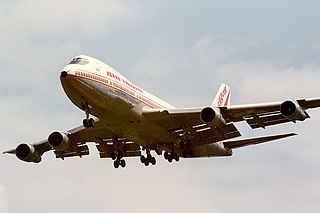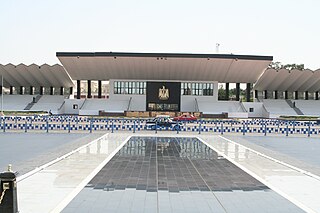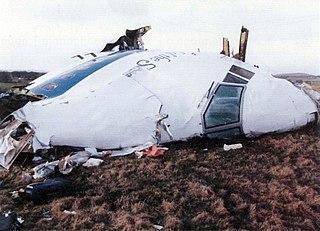
Al-Qaeda is a pan-Islamist militant organization led by Sunni jihadists who self-identify as a vanguard spearheading a global Islamist revolution to unite the Muslim world under a supra-national Islamic caliphate. Its membership is mostly composed of Arabs but also includes people from other ethnic groups. Al-Qaeda has mounted attacks on civilian, economic and military targets of the U.S. and its allies; such as the 1998 US embassy bombings, the USS Cole bombing, and the September 11 attacks.

Terrorism, in its broadest sense, is the use of violence against non-combatants to achieve political or ideological aims. The term is used in this regard primarily to refer to intentional violence during peacetime or in the context of war against non-combatants. There are various different definitions of terrorism, with no universal agreement about it. Different definitions of terrorism emphasize its randomness, its aim to instill fear, and its broader impact beyond its immediate victims.
Islamic terrorism refers to terrorist acts carried out by fundamentalist militant Islamists and Islamic extremists.

Terrorism and mass attacks in Canada includes acts of terrorism, as well as mass shootings, vehicle-ramming attacks, mass stabbings, and other such acts committed in Canada that people may associate with terroristic tactics but have not been classified as terrorism by the Canadian legal system.

Jihadism is a neologism for modern armed militant Islamic movements that seek to establish states based on Islamic principles. In a narrower sense, it refers to the belief that armed confrontation is a theologically legitimate method of socio-political change towards an Islamic system of governance.

Terrorism in Egypt in the 20th and 21st centuries has targeted the Egyptian government officials, Egyptian police and Egyptian army members, tourists, Sufi Mosques and the Christian minority. Many attacks have been linked to Islamic extremism, and terrorism increased in the 1990s when the Islamist movement al-Gama'a al-Islamiyya targeted high-level political leaders and killed hundreds – including civilians – in its pursuit of implementing traditional Sharia law in Egypt.
Terrorism in Australia deals with terrorist acts in Australia as well as steps taken by the Australian government to counter the threat of terrorism. In 2004 the Australian government has identified transnational terrorism as also a threat to Australia and to Australian citizens overseas. Australia has experienced acts of modern terrorism since the 1960s, while the federal parliament, since the 1970s, has enacted legislation seeking to target terrorism.
Evan F. Kohlmann is an American terrorism consultant who has worked for the FBI and other governmental organizations.

Terrorism in the United Kingdom, according to the Home Office, poses a significant threat to the state. There have been various causes of terrorism in the UK. Before the 2000s, most attacks were linked to the Northern Ireland conflict. In the late 20th century there were also attacks by Islamic terrorist groups. Since 1970, there have been at least 3,395 terrorist-related deaths in the UK, the highest in western Europe. The vast majority of the deaths were linked to the Northern Ireland conflict and happened in Northern Ireland. In mainland Great Britain, there were 430 terrorist-related deaths between 1971 and 2001. Of these, 125 deaths were linked to the Northern Ireland conflict, and 305 deaths were linked to other causes, including 270 in the Lockerbie bombing. Since 2001, there have been almost 100 terrorist-related deaths in Great Britain.
Jytte Klausen is a Danish-born scholar of politics who teaches at Brandeis University in Waltham, Massachusetts as the Lawrence A. Wien Professor of International Cooperation in the Department of Politics. Klausen has also served as an affiliate at the Minda de Gunzburg Center for European Studies at Harvard, among other positions.
Colleen Renée LaRose, also known as Jihad Jane and Fatima LaRose, is an American citizen who was convicted and sentenced to 10 years for terrorism-related crimes, including conspiracy to commit murder and providing material support to terrorists.
On June 5, 2010, in a covert American anti-terrorism operation named "Operation Arabian Knight", two American citizens Mohamed Mahmood Alessa and Carlos "Omar" Eduardo Almonte, New Jersey residents, were arrested at Kennedy International Airport in New York City. The men were in the process of boarding booked, separate flights to Egypt. According to the affidavit filed in support of the federal criminal complaint, they planned to travel to Somalia to join Al-Shabab, an Al Qaeda-linked terrorist group recruiting foreigners for its civil war. They intended to join them in killing American troops in Somalia, although few Americans are stationed there. The two men were charged with conspiring to kill, maim, and kidnap people outside the U.S.

Inspire is an English-language online magazine published by the organization al-Qaeda in the Arabian Peninsula (AQAP). The magazine is one of the many ways AQAP uses the Internet to reach its audience. Numerous international and domestic extremists motivated by radical interpretations of Islam have been influenced by the magazine and, in some cases, used its bomb-making instructions in their attempts to carry out attacks. The magazine is an important brand-building tool, not just of AQAP, but of all al-Qaeda branches, franchises and affiliates.
Jihadi tourism, also referred to as jihad tourism or jihadist tourism, is a term sometimes used to describe travel to foreign destinations with the object of scouting for terrorist training. US diplomatic cables leaked in 2010 have raised concerns about this form of travel. Within intelligence circles, the term is also sometimes applied dismissively to travellers who are assumed to be seeking contact with extremist groups mainly out of curiosity.
Islamic extremism in the United States comprises all forms of Islamic extremism occurring within the United States. Islamic extremism is an adherence to fundamentalist interpretations of Islam, potentially including the promotion of violence to achieve political goals. In the aftermath of the September 11, 2001 terror attacks, Islamic extremism became a prioritized national security concern of the U.S. government and a focus of many subsidiary security and law enforcement entities. Initially, the focus of concern was on foreign Islamic terrorist organizations, particularly al-Qaeda, but in the course of the years since the September 11 terror attacks, the focus has shifted more towards Islamic extremist radicalized individuals and jihadist networks within the United States.
The Egyptian Islamic Jihad, formerly called simply Islamic Jihad and the Liberation Army for Holy Sites, originally referred to as al-Jihad, and then the Jihad Group, or the Jihad Organization, was an Egyptian Islamist group active from the late 1970s until its 2001 merger with Al-Qaeda. It was long considered an affiliate of Al-Qaeda and under worldwide embargo by the United Nations. It was also banned by several individual governments worldwide. The group is a proscribed terrorist group organization in the United Kingdom under the Terrorism Act 2000.

Domestic terrorism or homegrown terrorism is a form of terrorism in which victims "within a country are targeted by a perpetrator with the same citizenship" as the victims. There are various different definitions of terrorism, with no universal agreement about it.

Islamic terrorism has been carried out in Europe by the jihadist groups Islamic State (ISIL) or Al-Qaeda as well as Islamist lone wolves since the late 20th century. Europol, which releases the annual EU Terrorism Situation and Trend report (TE-SAT), used the term "Islamist terrorism" in reports for the years 2006–2010, "religiously inspired terrorism" for the years 2011–2014, and has used "jihadist terrorism" since then. Europol defines jihadism as "a violent ideology exploiting traditional Islamic concepts".
Online youth radicalization is the action in which a young individual or a group of people come to adopt increasingly extreme political, social, or religious ideals and aspirations that reject, or undermine the status quo or undermine contemporary ideas and expressions of a state, which they may or may not reside in. Online youth radicalization can be both violent or non-violent.
Operation Guava is the code name for a long-term British Security Service (MI5) operation. The operation tracked a terrorist cell, which planned "a significant terrorist plot." The Operation Guava plotters used the Al-Qaeda in the Arabian Peninsula magazine Inspire as an instruction manual for the bomb they planned to leave in a toilet stall at the London Stock Exchange. The police code name for the investigation was Operation Norbury.








